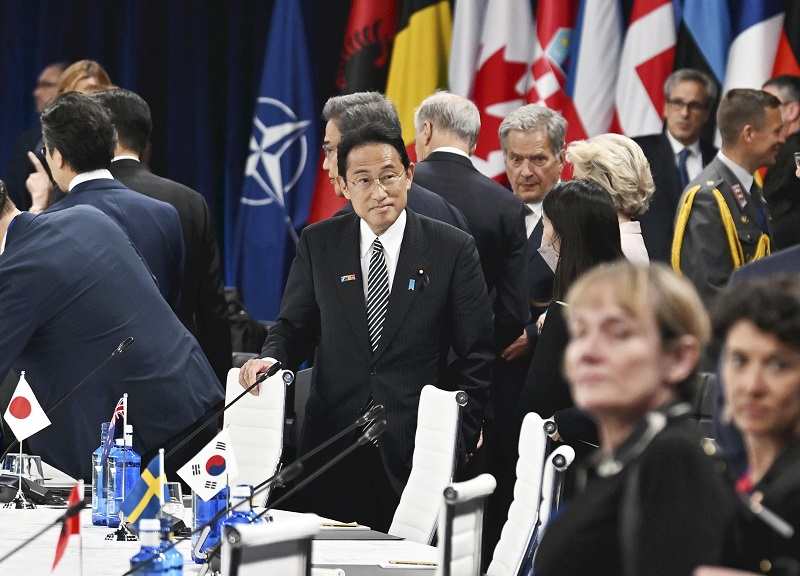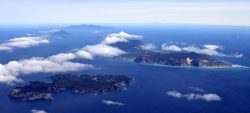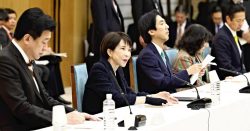
Prime Minister Fumio Kishida attends a summit meeting of the North Atlantic Treaty Organization in Madrid on Wednesday.
20:00 JST, July 1, 2022
Prime Minister Fumio Kishida returned to Japan Thursday following a European trip that included Group of Seven and North Atlantic Treaty Organization summit meetings.
Serving as a bridge between Europe and the Indo-Pacific region, Kishida made his presence felt during the trip, with European countries sharing a sense of caution regarding China’s increasingly hegemonic behavior and G7 leaders including harsh criticism of Beijing in their summit statement.
“I confirmed the awareness that the security of Europe and the Indo-Pacific are inseparable, and that any change in the status quo by force will not be tolerated in any region,” Kishida said to reporters in Madrid on Wednesday night before boarding a flight back to Japan.
“Participating in a summit where a new Strategic Concept has been finalized is of historic significance,” he said.
The Strategic Concept, which will guide NATO’s actions for the next 10 years, mentioned China for the first time and highlighted the threat posed by China’s hegemonic activities.
“In some respects, the fact that Japan has been pushing for increased vigilance toward China suggests our efforts have been successful,” a senior foreign ministry official said.
Although attention was focused on Russia’s invasion of Ukraine at the G7 summit in Germany that preceded the NATO talks, Kishida raised issues such as China’s development of gas fields in the East China Sea and its intrusion into Japanese territorial waters around the Senkaku Islands in Okinawa Prefecture.
His efforts were reflected in the summit statement, which stated: “We remain seriously concerned about the situation in the East and South China Seas. We strongly oppose any unilateral attempts to change the status quo by force or coercion that increase tensions… We stress that there is no legal basis for China’s expansive maritime claims in the South China Sea.”
Kishida also focused on bringing the G7 closer to Asia and Africa. “As the only G7 member in Asia, I have been actively reaching out directly to the leaders of Asian countries,” Kishida said Tuesday at a G7 meeting on multilateralism.
He cited the Japan-Vietnam summit in May, at which “an agreement was reached on such issues as sovereignty and respect for territory that was conveyed around the world,” reflecting the importance he places on continuously making efforts even with countries that have close ties with Russia.
Kishida also had summit meetings with the leaders of Senegal and South Africa, both of which were invited to the G7 summit, and worked to dispel Moscow’s claim that sanctions against Russia are the cause of the food crisis.
“The international community must cooperate to prevent the world from returning to an era in which major powers force smaller countries to be obedient,” Kishida said at the G7 summit.
In May next year, the prime minister will chair the G7 summit in Hiroshima, where the major challenge will be how to expand the circle of solidarity to maintain the international order.
Top Articles in Politics
-

Japan PM Takaichi’s Cabinet Resigns en Masse
-

Sanae Takaichi Elected Prime Minister of Japan; Keeps All Cabinet Appointees from Previous Term
-

Japan’s Govt to Submit Road Map for Growth Strategy in March, PM Takaichi to Announce in Upcoming Policy Speech
-

LDP Wins Historic Landslide Victory
-

LDP Wins Landslide Victory, Secures Single-party Majority; Ruling Coalition with JIP Poised to Secure Over 300 seats (UPDATE 1)
JN ACCESS RANKING
-

Producer Behind Pop Group XG Arrested for Cocaine Possession
-

Japan PM Takaichi’s Cabinet Resigns en Masse
-

Man Infected with Measles Reportedly Dined at Restaurant in Tokyo Station
-

Israeli Ambassador to Japan Speaks about Japan’s Role in the Reconstruction of Gaza
-

Videos Plagiarized, Reposted with False Subtitles Claiming ‘Ryukyu Belongs to China’; Anti-China False Information Also Posted in Japan























